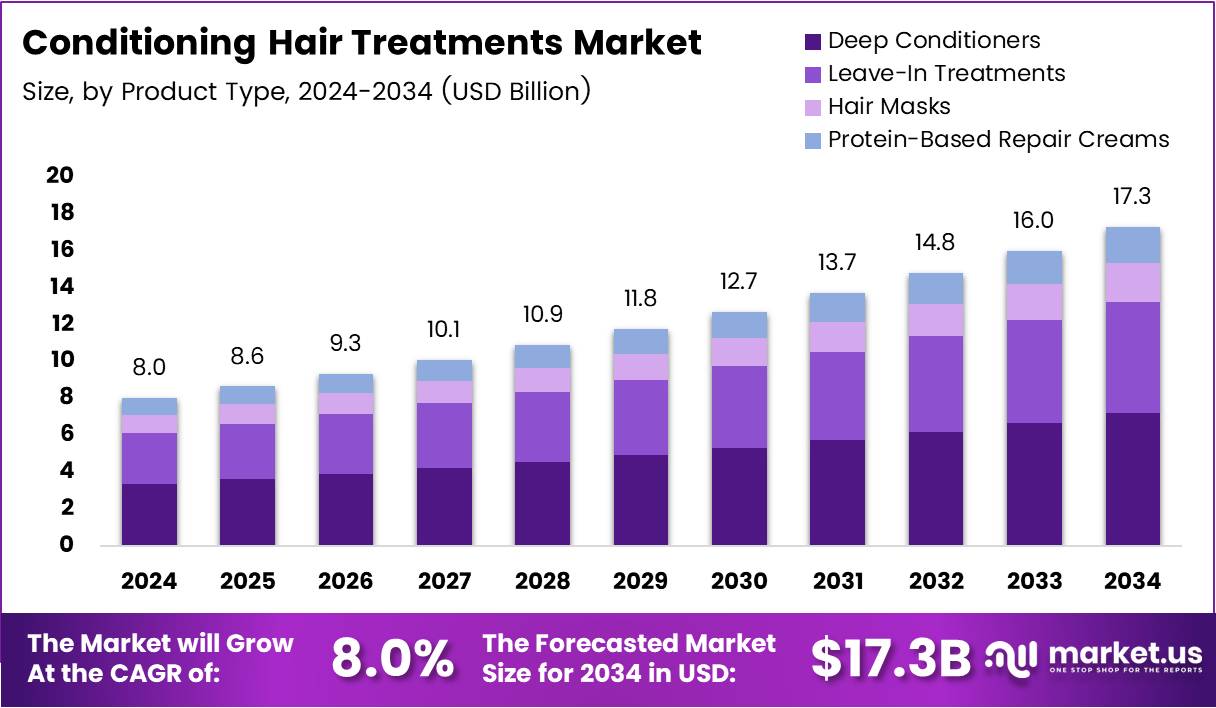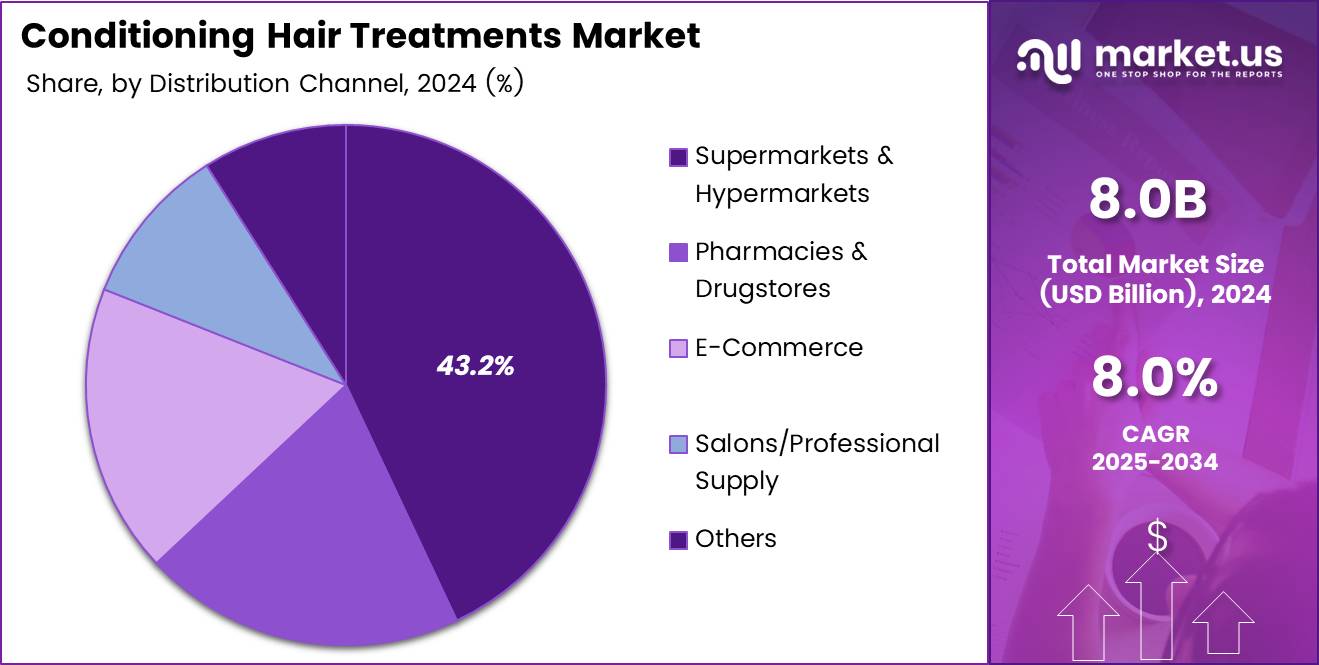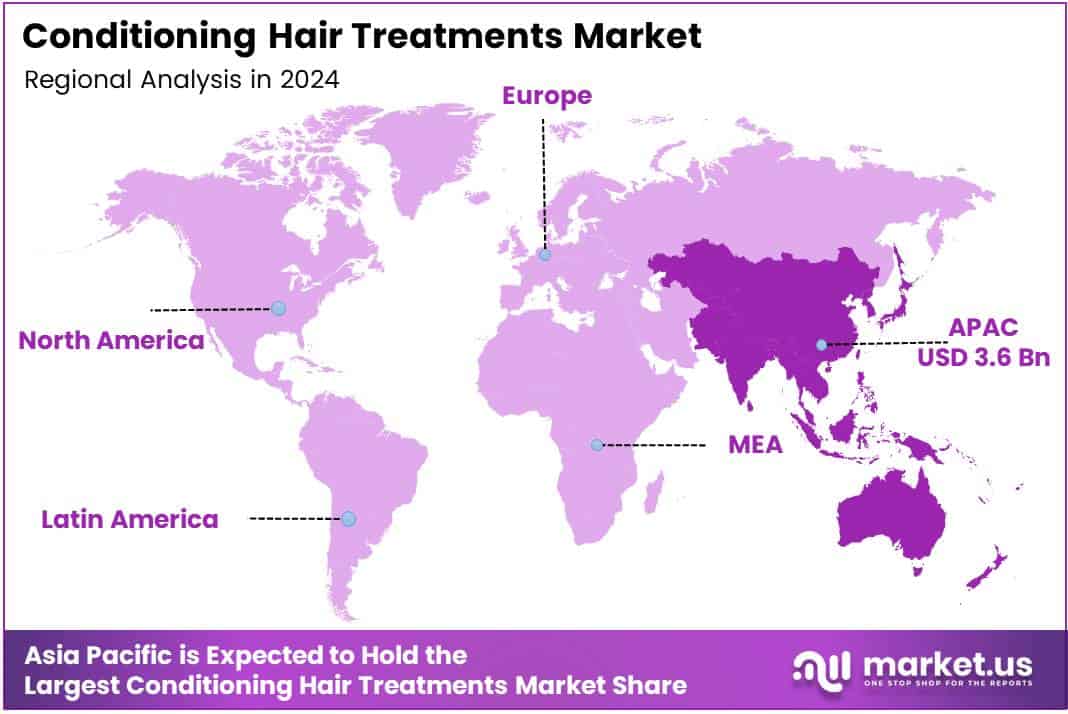Report Overview
The Global Conditioning Hair Treatments Market size is expected to be worth around USD 17.3 Billion by 2034, from USD 8.0 Billion in 2024, growing at a CAGR of 8% during the forecast period from 2025 to 2034.
The Conditioning Hair Treatments Market represents a fast-evolving segment within the global beauty and personal care industry. It includes products designed to restore hair moisture, reduce damage, and enhance texture. Driven by increasing beauty consciousness and product innovation, consumers are prioritizing deep nourishment and long-term scalp health solutions.

Furthermore, rising awareness around hair damage caused by pollution, styling, and chemical exposure is fueling market expansion. Brands are introducing natural and chemical-free conditioners to meet the demand for sustainable and safe formulations. As consumers seek effective repair solutions, premium and salon-grade treatments are witnessing steady adoption.
Moreover, the growth of e-commerce platforms has accelerated product accessibility and brand visibility. Digital influencers and targeted marketing campaigns are reshaping buying patterns, encouraging consumers to experiment with customized conditioners. Manufacturers are also focusing on inclusive formulations catering to various hair types and regional textures.
In addition, emerging economies are seeing increasing demand due to improving disposable income and lifestyle shifts. Governments across Asia and Europe are supporting cosmetic manufacturing under quality and safety regulations, encouraging domestic production. These policy frameworks are attracting new investments in research and product innovation for conditioning hair treatments.
From a sustainability standpoint, eco-friendly packaging and cruelty-free formulations are becoming major market differentiators. Consumers are aligning personal care choices with environmental values, pushing brands to adopt ethical sourcing and biodegradable materials. This transition is fostering long-term competitiveness in the conditioning segment.
According to industry reports, in the U.S., 86% of adults use shampoo or conditioner in their hair-care routine. Additionally, 79% of men vs 93% of women use these products, showing gender-driven product demand.
A global Dyson survey across 23,000 respondents found ~70% perceive they have damaged hair, highlighting treatment needs. Furthermore, only 34% of U.S. adults consistently use the same conditioner brand (vs 45% for shampoo), suggesting strong brand-switching behavior and market opportunity for innovation.
Key Takeaways
The Global Conditioning Hair Treatments Market was valued at USD 8.0 Billion in 2024 and is projected to reach USD 17.3 Billion by 2034, growing at a CAGR of 8%.
Deep Conditioners dominated the market by product type with a 38.4% share in 2024 due to their intensive nourishment and repair benefits.
Under hair concern, Dry & Damaged Hair led with a 39.5% share, driven by increasing exposure to pollution, heat, and chemical styling.
By distribution channel, Supermarkets & Hypermarkets held the highest share of 43.2% in 2024 owing to easy accessibility and wide product variety.
The Asia Pacific region dominated the market with a 45.9% share, valued at approximately USD 3.6 Billion in 2024.
By Product Type Analysis
Deep Conditioners dominate with 38.4% due to their intensive nourishment and repair properties for damaged hair.
In 2024, Deep Conditioners held a dominant market position in the By Product Type segment of the Conditioning Hair Treatments Market, with a 38.4% share. Their rich formulations, designed to restore moisture and elasticity, appeal to consumers dealing with chemical damage or heat styling. The strong preference for deep nourishment solutions continues to drive this segment’s growth globally.
Leave-In Treatments are gaining traction as consumers prioritize convenience and all-day protection. These products offer lightweight conditioning and manageability, making them ideal for daily use and travel. The growing popularity of multitasking formulations that detangle, protect from UV, and enhance shine supports their rising adoption.
Hair Masks have emerged as a preferred at-home spa solution, offering intense hydration and targeted repair. Increasing consumer focus on self-care routines and DIY beauty treatments has fueled their usage. Brands are introducing masks infused with natural oils, keratin, and vitamins to address various hair concerns effectively.
Protein-Based Repair Creams cater to consumers seeking long-term strengthening and reconstruction of brittle strands. Their high protein and amino acid content help reduce breakage and improve resilience. The increasing demand for damage-repair solutions in professional salons and home care continues to boost their market share.
By Hair Concern Analysis
Dry & Damaged Hair dominates with 39.5% owing to increasing exposure to heat, pollution, and chemical styling.
In 2024, Dry & Damaged Hair held a dominant market position in the By Hair Concern segment of the Conditioning Hair Treatments Market, with a 39.5% share. Growing consumer awareness about hair health and the effects of environmental stressors have accelerated the demand for restorative products designed to repair and hydrate hair fibers.
Color-Treated Hair represents a growing niche as consumers seek color-protective formulas that enhance vibrancy and reduce fading. Brands are innovating with sulfate-free and pH-balanced conditioners to retain color intensity while maintaining hair softness and shine, particularly in premium and salon-based offerings.
Frizz Control treatments continue to expand as consumers desire smooth, manageable hair in humid environments. Formulations enriched with natural oils, silicones, and botanical extracts are increasingly popular for providing anti-frizz and anti-humidity benefits without weighing hair down.
Split-End Repair products target the growing problem of mechanical and thermal damage. With consumers favoring repair-based solutions, these conditioners use peptides and strengthening ingredients to seal split ends temporarily and improve appearance between salon visits.
Others include products addressing scalp sensitivity, volume enhancement, and overall hair vitality. Innovation in lightweight, hybrid treatments and gender-neutral formulations is expanding this segment’s reach among broader demographics.
By Distribution Channel Analysis
Supermarkets & Hypermarkets dominate with 43.2% as they provide easy accessibility and wide product variety.
In 2024, Supermarkets & Hypermarkets held a dominant market position in the By Distribution Channel segment of the Conditioning Hair Treatments Market, with a 43.2% share. These stores remain the preferred retail destination due to affordable pricing, product diversity, and the growing shelf presence of both mass-market and premium brands.
Pharmacies & Drugstores are gaining attention for their credibility and dermatologist-backed product offerings. Consumers prefer these outlets for specialized and safe formulations, particularly those addressing scalp health, dryness, or sensitivity concerns. Their trusted retail environment supports steady sales growth.
E-Commerce channels continue to expand rapidly as consumers shift toward digital convenience. Online platforms allow easy comparison, exclusive discounts, and access to niche and international brands. The surge in influencer marketing and subscription-based product models further enhances their growth trajectory.
Salons/Professional Supply outlets cater to premium and treatment-grade products favored by stylists and professionals. The increasing demand for in-salon treatments and post-service care solutions continues to drive this distribution channel.
Others include specialty beauty stores and direct-to-consumer brands offering customized formulations. These emerging sales points benefit from the rising trend of personalized hair care and sustainable product packaging.

Key Market Segments
By Product Type
Deep Conditioners
Leave-In Treatments
Hair Masks
Protein-Based Repair Creams
By Hair Concern
Dry & Damaged Hair
Color-Treated Hair
Frizz Control
Split-End Repair
Others
By Distribution Channel
Supermarkets & Hypermarkets
Pharmacies & Drugstores
E-Commerce
Salons/Professional Supply
Others
Drivers
Rising Consumer Demand for Damage-Repair and Deep-Conditioning Treatments Drives Market Growth
Growing heat styling, chemical hair treatments, and exposure to pollution have led to significant hair damage among consumers. This has increased the demand for intensive conditioning and repair treatments that restore hair strength and shine. Brands are developing advanced formulas with proteins and botanical oils to meet this growing need.
Consumers are now more aware of product ingredients, pushing companies to develop natural, organic, and “clean-beauty” conditioning solutions. Formulas free from sulfates, silicones, and parabens are gaining strong traction as they appeal to health-conscious users seeking gentle yet effective care.
Additionally, the rising interest in male grooming is reshaping market dynamics. Men are increasingly integrating conditioners, hair masks, and leave-in treatments into their daily routines, expanding the consumer base for premium hair conditioning products.
Lastly, the expansion of e-commerce platforms and direct-to-consumer channels has enhanced product accessibility. Online tutorials and influencer endorsements are helping consumers discover niche and professional-grade conditioning products, thereby strengthening market penetration across both urban and emerging regions.
Restraints
Intense Competition and Market Saturation Challenge Market Differentiation
The conditioning hair treatments market faces strong competition, with numerous global and regional brands offering similar products. This saturation reduces differentiation and pressures companies to innovate through unique formulations or branding strategies. Price wars further narrow profit margins, making it difficult for smaller players to sustain.
Regulatory hurdles also pose challenges for brands aiming to achieve clean, vegan, or cruelty-free certifications. The stringent guidelines and sourcing limitations can increase formulation costs and delay product launches. Ensuring compliance across multiple regions remains a significant restraint.
Moreover, consumer skepticism about product claims is rising. Many consumers question the efficacy of “damage-repair” or “deep-conditioning” promises due to exaggerated marketing. The influx of counterfeit or low-quality products in online marketplaces further undermines trust, discouraging repeat purchases and affecting the market’s overall credibility.
Growth Factors
Development of Personalized and Scalp-Specific Solutions Unlocks New Growth Potential
The next phase of growth lies in personalized hair conditioning treatments. Advances in diagnostics and smart formulation technology enable brands to create data-driven, scalp-specific solutions. This personalization trend caters to unique hair needs, improving efficacy and customer satisfaction.
Another major opportunity is the rise of multifunctional products that address multiple concerns simultaneously. Consumers increasingly prefer treatments that combine repair, UV-shielding, anti-pollution, and color protection in one product, offering convenience and premium value.
Additionally, the salon-to-home hybrid model is expanding rapidly. Professional-grade products once limited to salons are now available for at-home use, bridging the gap between luxury and accessibility. This model enhances brand loyalty, particularly as consumers seek salon-quality results without frequent visits.
Emerging Trends
Surge in Texture-Specific and Eco-Sustainable Conditioning Hair Treatments Shapes Market Trends
A strong trend shaping the market is the rise of texture-specific conditioning treatments, especially for curly, coily, frizzy, or ethnic hair. Brands are formulating targeted products enriched with nourishing oils and moisture-retention agents to cater to diverse hair textures.
Sustainability is another dominant trend, driving the adoption of eco-friendly packaging such as refillable containers and zero-waste solutions. Consumers increasingly favor brands that align with their environmental values, pushing companies toward circular design and recyclable materials.
Furthermore, salon-quality treatments, including masks, leave-in conditioners, and bond-repair formulas, are entering mainstream retail. This democratization of premium care enables wider consumer access to high-performance products.
Finally, social media and influencer-driven hair-care routines—such as hair cycling and scalp health regimens—are fueling consumer experimentation. Online visibility and education are accelerating brand awareness and influencing purchase decisions across global markets.
Regional Analysis
Asia Pacific Dominates the Conditioning Hair Treatments Market with a Market Share of 45.9%, Valued at USD 3.6 Billion
In 2024, the Asia Pacific region led the global conditioning hair treatments market, capturing a dominant 45.9% share and generating revenues worth approximately USD 3.6 billion. This leadership is driven by high consumer awareness in countries such as Japan, China, and South Korea, where multi-step hair-care routines are deeply integrated into daily life.
The growing middle-class population, coupled with rapid urbanization and rising disposable incomes, continues to boost spending on premium and personalized hair-conditioning products. Expanding online retail networks further strengthen APAC’s dominance in this segment.

North America Conditioning Hair Treatments Market Trends
North America maintains a significant position in the global market, supported by rising demand for salon-quality conditioning solutions and at-home repair treatments. The region’s consumers favor sulfate-free, cruelty-free, and ingredient-transparent products that align with clean-beauty values. In 2024, increasing male grooming trends and high product innovation across the U.S. and Canada contributed to consistent market expansion.
Europe Conditioning Hair Treatments Market Trends
Europe’s market shows solid growth, driven by consumer preference for vegan, organic, and dermatologically tested formulations. The influence of strict EU cosmetic regulations ensures high-quality and safety standards, which support market credibility. In 2024, rising adoption of sustainable packaging and premium formulations has reinforced Europe’s position as a mature but innovative regional market for conditioning hair treatments.
Latin America Conditioning Hair Treatments Market Trends
Latin America demonstrates steady progress as consumers seek deep-conditioning and anti-frizz products suitable for humid climates. Countries such as Brazil and Mexico are key contributors, with expanding beauty retail and e-commerce sectors supporting wider product accessibility. Growing awareness about damage-repair treatments among urban consumers continues to drive market adoption across the region.
Middle East & Africa Conditioning Hair Treatments Market Trends
The Middle East & Africa region is gradually emerging as a promising market, driven by increased attention to scalp health and hydration. Consumers favor rich-moisture and keratin-based treatments tailored for dry or textured hair. In 2024, the expanding presence of professional salons and premium beauty retailers helped boost market visibility and accessibility across major urban centers like Dubai, Riyadh, and Johannesburg.
Key Regions and Countries
North America
Europe
Germany
France
The UK
Spain
Italy
Rest of Europe
Asia Pacific
China
Japan
South Korea
India
Australia
Rest of APAC
Latin America
Brazil
Mexico
Rest of Latin America
Middle East & Africa
GCC
South Africa
Rest of MEA
Key Conditioning Hair Treatments Company Insights
L’Oréal Professionnel continues to lead the global conditioning hair treatments market in 2024 through innovation in salon-grade and at-home care solutions. The brand’s expertise in advanced formulations combining ceramides and amino acids strengthens hair resilience, while its professional network enhances product reach across both premium and mainstream consumer segments worldwide.
Pantene maintains a dominant position by leveraging its strong retail presence and trust in Pro-Vitamin B5 technology. Its focus on strengthening and moisture-locking formulations appeals to a broad demographic. Pantene’s strategic expansion in sulfate-free and clean beauty categories further supports consumer loyalty in the evolving hair care market.
Moroccanoil remains a key influencer in the premium segment with its argan oil–infused conditioning products that emphasize hydration and shine restoration. The brand’s marketing around smoothness and natural nourishment resonates strongly with eco-conscious consumers seeking effective, ingredient-driven care. Its growing footprint in salons and e-commerce continues to enhance brand visibility globally.
Kerastase stands out for its science-backed luxury positioning and focus on personalized hair care rituals. Its conditioning treatments integrate advanced lipid and protein repair technologies that cater to damaged and chemically treated hair. Kerastase’s emphasis on individualized diagnosis-based regimens strengthens its premium appeal among professional stylists and high-end consumers alike.
Overall, these leading players drive the conditioning hair treatments market by combining innovation, ingredient transparency, and strong branding strategies. Their focus on clean formulations, personalization, and digital engagement reinforces consumer confidence and fuels continued market expansion.
Top Key Players in the Market
Recent Developments
In October 2025, Veradermics announced an oversubscribed $150 million Series C financing to advance VDPHL01 through multiple Phase 3 trials, positioning it as the first non-hormonal oral therapeutic for hair regrowth in both women and men.
In September 2024, hair care brand Arata raised $4 million in Series A funding led by Unilever Ventures to support expansion and product innovation within its natural and sustainable hair-care range.
In January 2024, hair and scalp brand Jupiter secured $3 million in new funding aimed at accelerating its growth across digital channels and expanding its clinical-grade scalp-care portfolio.
In August 2024, Great Many raised $3.6 million in pre-seed funding to develop and scale affordable, science-based hair growth solutions, improving accessibility for consumers seeking effective regrowth products.
Report Scope
